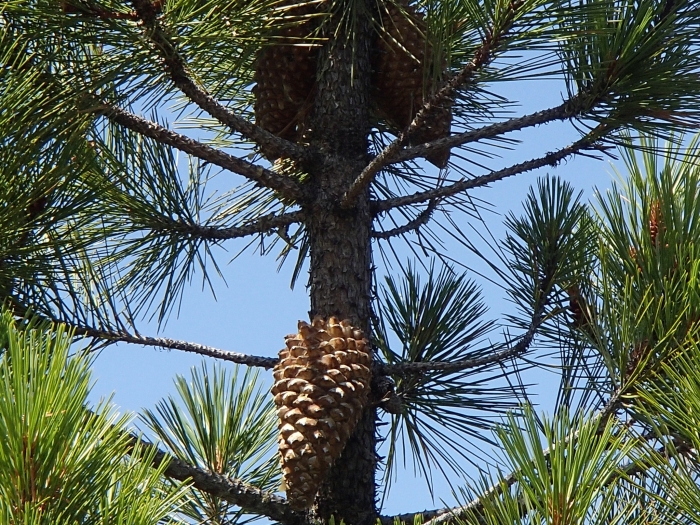Knobcone Pine
(Pinus attenuata)
Knobcone Pine (Pinus attenuata)
/
/

Tom Wainwright
CC BY 4.0
Image By:
Tom Wainwright
Recorded By:
Copyright:
CC BY 4.0
Copyright Notice:
Photo by: Tom Wainwright | License Type: CC BY 4.0 | License URL: http://creativecommons.org/licenses/by/4.0/ | Rights Holder: Tom Wainwright | Publisher: iNaturalist | Date Created: 2019-07-13T13:55:19-07:00 |






















































Estimated Native Range
Summary
Pinus attenuata, commonly known as Knobcone Pine, is an evergreen tree native to the mountainous regions of Oregon, California, and the slopes of Northwestern Mexico. It is adapted to thrive in both mixed coniferous forests and the chaparral biome, characterized by dense, spiny shrubs and periodic wildfires. Individual specimens can live up to a century, and the species is notable for its resilience in its native fire-prone habitats. The Knobcone Pine typically reaches heights of 8–24 meters (26–79 feet) and can adopt a shrubby form on poor sites. Its crown is conical with a straight trunk. The bark is thin, smooth, and flaky with a gray-brown color when young, maturing to a dark gray-red-brown with shallow furrows and flat scaly ridges.
The Knobcone Pine is appreciated for its unique cones, which are sealed with resin and can remain closed for years until exposed to the heat of a wildfire. The leaves are in fascicles of three, needle-like, yellow-green, and twisted, adding texture to the tree’s appearance. It is not commonly used for lumber due to its knotty wood. In cultivation, it is valued for its adaptability and is used in reforestation projects, natural landscaping, and as a fire-resistant species. It requires full sun, low water once established, and well-drained soils. While it is not typically grown for ornamental purposes, its distinctive cones and rugged form can add interest to naturalistic plantings. Potential problems include susceptibility to pine beetle infestations and pitch canker disease.CC BY-SA 4.0
The Knobcone Pine is appreciated for its unique cones, which are sealed with resin and can remain closed for years until exposed to the heat of a wildfire. The leaves are in fascicles of three, needle-like, yellow-green, and twisted, adding texture to the tree’s appearance. It is not commonly used for lumber due to its knotty wood. In cultivation, it is valued for its adaptability and is used in reforestation projects, natural landscaping, and as a fire-resistant species. It requires full sun, low water once established, and well-drained soils. While it is not typically grown for ornamental purposes, its distinctive cones and rugged form can add interest to naturalistic plantings. Potential problems include susceptibility to pine beetle infestations and pitch canker disease.CC BY-SA 4.0
Plant Description
- Plant Type: Tree
- Height: 20-80 feet
- Width: 20-25 feet
- Growth Rate: Rapid
- Flower Color: N/A
- Flowering Season: Non-Flowering
- Leaf Retention: Evergreen
Growth Requirements
- Sun: Full Sun
- Water: Low
- Drainage: Medium, Fast
Common Uses
Bird Garden, Deer Resistant, Drought Tolerant, Erosion Control, Fragrant, Low Maintenance, Rabbit Resistant
Natural Habitat
native to the mountainous regions of Oregon, California, and the slopes of Northwestern Mexico
Other Names
Common Names: Narrowcone Pine, Höcker-Kiefer, Chichonuda, Pino De Cono Pitonudo, Pino De Piña "Chichonuda", Pin De L’Eldorado, Pin À Cônes Pointus, Kaliforniai Kampós Fenyo, Pino Attenuato, Kvrgavi Bor
Scientific Names: , Pinus attenuata, Pinus tuberculata, Pinus tuberculata var. acuta,
GBIF Accepted Name: Pinus attenuata Lemmon